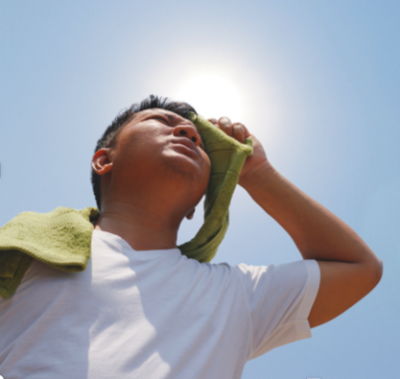How to Prevent Heat-Related Illnesses This Summer
How to Prevent Heat-Related Illnesses This Summer
Enjoying the outdoors and warmer temperatures is a part of summertime tradition for long-term care residents. Switching up indoor routines and soaking up some vitamin D while enjoying the fresh, outdoor air can provide residents and staff with many mental and emotional benefits. While you’re planning for activities that are fun in the sun and enjoying the outdoors, it’s important to be vigilant with recognizing heat-related symptoms and illnesses for your staff and residents.
Heat-related illnesses can affect a person due to excessive heat that increases their body’s core temperature. This can happen if you spend too much time outside during extremely hot or humid days (when humidity is greater than 60 percent) or if you are exercising outdoors making sweat evaporation hard and causing your body to overheat. When your body is not able to properly balance salt and water, your temperature rises, and sweat fails to keep you cool.

Those who are most at risk for heat-related illnesses are older adults, very young children, people with chronic diseases, and mental illness, according to the Center for Disease Control and Prevention (CDC). Other factors that can contribute to heat-related illnesses are obesity, fever, dehydration, heart disease, poor circulation, sunburn, alcohol, and prescription drug use. Illnesses caused by heat are dangerous as they can cause damage to the brain and other vital organs. Some common heat-related illnesses are heat exhaustion or heatstroke.
Signs to look for in heat exhaustion:
- Heavy sweating
- Cold, pale, and clammy skin
- Fast, week pulse
- Nausea or vomiting
- Dizziness, fainting, or tiredness
Ways to help someone with heat exhaustion are to move them to a cool place, loosen the clothes, and put wet cloths on their body to help them cool down.
 Signs to look for in heatstroke:
Signs to look for in heatstroke:
- High body temperatures exceeding 103 degrees
- Hot, red, dry, or damp skin
- Fast, strong pulse
- Headache
- Dizziness
- Confusion
- Nausea
- Seizures
Be sure to call 911 right away as heatstroke is a medical emergency and can be deadly.
Ways to prevent and reduce the risk of heat illness
The good news is heat illnesses can be prevented. Here are some helpful tips to reduce your risk from the Cleveland Clinic.
- Even if you’re not thirsty, be sure to drink water every 15 minutes. If you want to track your water intake, aim for 16 to 32 ounces of water each hour.
- Break up being out in the heat (and direct sunlight) by opting for a shaded area, jumping in the pool to cool down, or going into an air-conditioned space.
- If you’re doing yard work or exercising outside, grab a hat to wear and choose lightweight and light-colored cotton clothing. Make sure to pace yourself in any physical activity while outdoors.
- Make sure you are using the bathroom frequently. This will be an indicator if you are dehydrated and are not drinking enough water.
- Apply then reapply sunscreen often.
- Along with water, sip on beverages with electrolytes (choose one low in sugar).
We want all of our facility partners, their staff members, and residents to enjoy their summer while being safe. If you have any questions, please reach out to our team at Hudson Regional LTC Pharmacy at 845-341-2700 and we will be happy to assist you.





